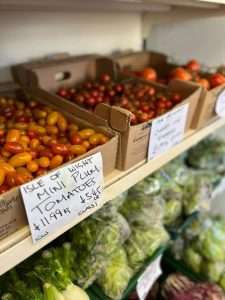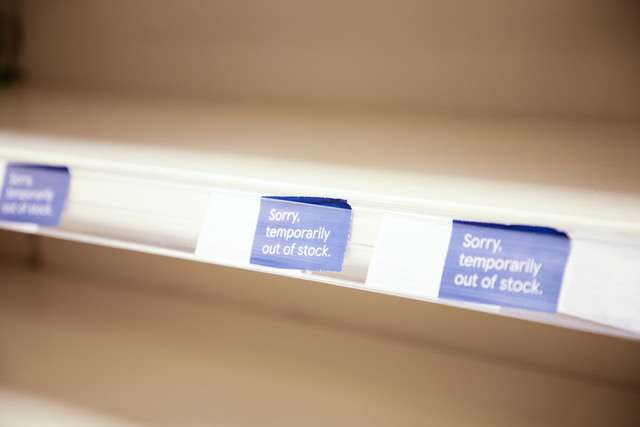by Ben Eagle (Acting Editor, Eat Farm Now)
Newspaper headlines have been increasingly panicked in recent days regarding food shortages and empty shelves in the fresh produce sections of supermarkets. Restrictions have been placed on various fruit, salad and vegetable products, including cucumbers, peppers and tomatoes and a number of factors have been blamed, from the weather in Morocco to Brexit. However, with soaring energy prices and growers receiving low returns for their produce, are we missing the real story? UK food producers are facing a critically uncertain future if they do not receive higher prices for their produce, but are the public and retailers willing to pay more?
In recent days most of the major supermarkets have placed restrictions on the number of tomatoes, peppers and cucumbers that customers can buy, including Tesco, Aldi, Lidl, Morrisons and Asda. Asda has also restricted numbers on lettuce, broccoli, cauliflower, raspberries and bags of salad.
The risk of supply volatility is nothing new. Due to seasonal growing conditions, the UK is most dependent on imported fresh produce at this time of year, leaving it open to the risks of the weather abroad and supply chain threats. According to the British Retail Consortium, which is a key trade association for UK retailers, Britain will generally import 95% of its tomatoes and 90% of its lettuces from December to March.
This said, there are numerous reports on twitter of shelves in local greengrocers, farm shops and other independent retailers, being fully stocked, which would suggest that this is something that goes beyond a general problem in the supply chain.
 Fully stocked shelves in independent farm shop, Dorset; image credit: Sophie Gregory
Fully stocked shelves in independent farm shop, Dorset; image credit: Sophie Gregory
Disruption to last several weeks
The disruption is likely to last for several weeks, with The British Growers Association warning that there may be further possible shortages of leeks, carrots, cabbages and cauliflowers. The longer-term picture isn’t any rosier. According to the National Farmers Union (NFU), which represents more than 46,000 growing and farming businesses, salad production yields are expected to drop to their lowest levels since records began in 1985.
The future for growers of British apples and pears also looks bleak, with many growers removing orchards and not renewing orders for new trees. Indeed, 150,000 of the 480,000 trees planned for planting this year have been cancelled.
The need to invest in food and farming
The story playing out on supermarket shelves is indicative of a wider issue at home: that Britain is becoming increasingly reliant on imports and the volatility this brings, due to chronic underinvestment and under-confidence in the farming sector, led by poor returns and significant input costs, including energy.
President of the National Farmers Union, Minette Batters has spoken on the need for backing the UK’s horticultural sector:
“The consequences of undervaluing growers can be seen on supermarket shelves right now,’’ she has said. ‘’Shelves are empty. This is a reality we’ve been warning government about for many months. Without urgent action there are real risks that empty shelves may become more commonplace as British horticulture businesses struggle with unprecedented inflationary pressures, most notably on energy and labour costs.’’
Farmers and growers face multiple challenges at the moment, from significant energy costs following the invasion of Ukraine a year ago to labour issues in the wake of Brexit and, critically, poor returns overall. If the problem is not dealt with it will simply keep returning.
Whilst a record number of people are depending on food banks, and food poverty is a significant issue, the reality is that the price that we pay for food isn’t nearly enough. As Jay Rayner has argued in a recent article, we need to deal both with poverty and the dysfunction of the food system, but they have their own individual challenges. If we don’t pay farmers and producers enough for them to invest in their businesses, the whole system will become more volatile.
NFU Vice President David Exwood has said: “We are repeatedly seeing a predictable combination of factors such as energy costs and weather leading to empty supermarket shelves. Our UK food resilience is currently gone. The government needs to take this seriously. Producers must have the confidence they need, working within a fair and transparent supply chain, ensuring fair and sustainable returns so they can do what they do best; produce nutritious, high quality British Food to meet demand from shoppers.”
Is this about the weather?
Some have blamed the weather conditions in countries such as Morocco for the shortages.
The UK traditionally imports products such as tomatoes from north Africa during the winter months to fill any gaps in supply and demand.
Andrew Opie, director of food and sustainability at the British Retail Consortium, has said: “Difficult weather conditions in the south of Europe and Northern Africa have disrupted harvest for some fruit and vegetables, including tomatoes and peppers.”
When Eat Farm Now approached Morrisons, they told us that they are supportive of this BRC statement.
Growers in Spain and Morocco faced drought and high temperatures last summer, followed by cold temperatures, heavy rain and flooding this winter which has led to immense disruption to supply. Therefore, it is clear that this has also played its part in the short-term issue of the empty shelves.
However, it is indicative of a wider issue. With challenges such as these, we cannot afford not to build resilience at home, and with climate change likely to bring further conditions like this in future, we have to take it seriously.
Is it about Brexit?
The weather, soaring costs and poor returns to producers are certainly playing their part, but, to a certain extent, Brexit is also a factor in this story, when looking at the capacity and resilience of domestic production. The post Brexit seasonal workers scheme has only granted six-month visas, when in reality growers need workers to stay for nine months, which means extra costs to cover the added bureaucracy, time and training requirements. Critically, these added costs are not being met by the returns.
Is it about energy?
The energy crisis has hit producers hard, and this is a major reason why production in Britain has dropped. As reported in The Guardian last week, one of the largest tomato growers in the country, ABS Group, said that they had left one in 12 of their glasshouses unplanted for the first time in 75 years.
Soaring energy costs along with high fertiliser prices and rises in the cost of packaging have all led to many producers deciding to produce less this winter. The cumulative effect is significant.
What are the farmers saying?
Clearly, there is a structural problem here and if the whole supply chain, along with the government, doesn’t come together to fix these issues, we will continue to see volatility in future.
In the next part of this article, published on Monday next week we will profile some farmer voices, to show what they are saying on the ground, about this fundamental issue.

